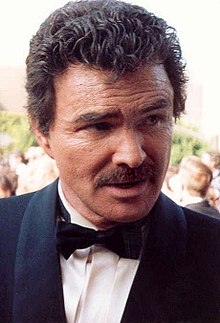Burt Reynolds
| Burt Reynolds | ||
 Reynolds in 1991 | ||
| Background information | ||
| Born as: | Burton Leon Reynolds Jr. | |
| Born | Feb 11, 1936 Lansing, Michigan, U.S. | |
| Died | Sep 6, 2018 - at age 81 Jupiter, Florida, U.S. | |
| Alma Mater: | Florida State University | |
| Partner(s): | Dinah Shore (1971-75) Sally Field (1976-80 | |
| Spouse(s): | Judy Carne (1963-65) div Loni Anderson (1988-94) div | |
| Children: | 1 | |
| Occupation: | Actor | |
| Years active | 1958–2018 | |
| Website: | Website | |
Burton Leon Reynolds Jr. (February 11, 1936 – September 6, 2018) was an American actor, considered a sex symbol and icon of 1970s American popular culture.
Reynolds first rose to prominence when he starred in television series such as "Gunsmoke" (1962–1965), "Hawk" (1966), and "Dan August" (1970–1971). Although Reynolds had leading roles in such films as Navajo Joe (1966) and 100 Rifles (1969), his breakthrough role was as Lewis Medlock in Deliverance (1972). Reynolds played the leading role – often a lovable rogue – in a number of subsequent box office hits, such as White Lightning (1973), The Longest Yard (1974), Smokey and the Bandit (1977), Semi-Tough (1977), The End (1978), Hooper (1978), Starting Over (1979), Smokey and the Bandit II (1980), The Cannonball Run (1981), Sharky's Machine (1981), The Best Little Whorehouse in Texas (1982), and Cannonball Run II (1984), several of which he directed himself, as well as Don Bluth's animated film All Dogs Go to Heaven (1989). He was nominated twice for the Golden Globe Award for Best Actor – Motion Picture Musical or Comedy.
Reynolds was voted the world's number one box-office star from 1978 to 1982 in the annual Top Ten Money Making Stars Poll, a record he shares with Bing Crosby. After a number of box-office failures, Reynolds returned to television, starring in the sitcom "Evening Shade" (1990–1994), which won him a Golden Globe Award and Primetime Emmy Award for Outstanding Lead Actor in a Comedy Series. His performance as high-minded pornographer Jack Horner in Paul Thomas Anderson's Boogie Nights (1997) brought him renewed critical attention, earning him another Golden Globe (for Best Supporting Actor – Motion Picture), with nominations for an Academy Award for Best Supporting Actor and a BAFTA Award for Best Supporting Actor.
Early life
Burton Leon Reynolds Jr. was born on February 11, 1936, to Harriet Fernette "Fern" (née Miller) and Burton Milo Reynolds (1906–2002). His family descended from Dutch, English, Scots-Irish, and Scottish ancestry. Reynolds also claimed Cherokee and Italian roots.
During his career, Reynolds often claimed to have been born in Waycross, Georgia, although in 2015, he stated that he was actually born in Lansing, Michigan. In his autobiography, he stated that Lansing was where his family lived when his father was drafted into the United States Army.
Reynolds, his mother, and his sister joined his father at Fort Leonard Wood, Missouri, where they subsequently lived for two years. When his father was sent to Europe, the family moved to Lake City, Michigan, where his mother had been raised. In 1946, the family moved to Riviera Beach, Florida. Reynolds' father eventually became Chief of Police of Riviera Beach, which is adjacent to the north end of West Palm Beach, Florida.
During 10th grade at Palm Beach High School, Reynolds was named First Team All State and All Southern as a fullback, and received multiple scholarship offers.
College
After graduating from Palm Beach High School, he attended Florida State University on a football scholarship and played halfback, starting in 1954. While at Florida State, he roomed with future college-football coach, broadcaster, and analyst Lee Corso, and also became a brother of the Phi Delta Theta fraternity.
Reynolds had an outstanding freshman year in football. However, he injured his knee in the first game of his sophomore season and, later that year, lost his spleen and injured his other knee in a bad car accident. He did not return to the university for almost two years. To keep up with his studies, he enrolled at Palm Beach Junior College (PBJC) in neighboring Lake Park in early 1956. When Reynolds returned to Florida State in 1957, he rejoined the football team, although his leg injured in the car accident slowed him down. He was blamed, fairly or not, for the team's loss to North Carolina State on October 12, 1957. Immediately following the game he told his teammates that he was done with football
- More information is available at [ Wikipedia:Burt_Reynolds ]
Chat rooms • What links here • Copyright info • Contact information • Category:Root